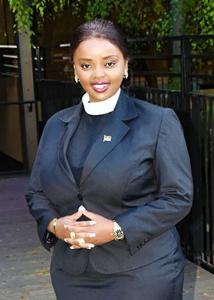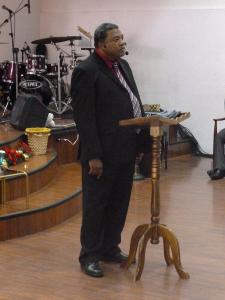 Every preacher must have in her homiletic quiver the arrow of the story of her call. The congregation has the right to know just why this person stands in front of them week after week and claims to speak for God, however they and she understand that claim. Those understandings are almost certainly very different, for it has long been noted that as a group preachers are far more progressive than those who sit in the pews. This is by no means always true—each of us can name places were it is decidedly false— but in general the preacher sees the world in rather different ways, rather more inclusive ways, than the majority of her hearers. When one studies Christian theology for any period of time, and if one takes that study with great seriousness, the call of God to announce a world that God has ordained, rather than one created by selfish and arrogant human beings, can become the mark of a thoughtful preacher’s ministry of the pulpit. That is why human desires to exclude, to puff oneself up, to grab for all the gusto one can get and the devil take the hindmost, are called into the most serious question by the power of the gospel as proclaimed from many pulpits. I trust I am not saying anything that many of you would find egregiously incorrect or unlikely.
Every preacher must have in her homiletic quiver the arrow of the story of her call. The congregation has the right to know just why this person stands in front of them week after week and claims to speak for God, however they and she understand that claim. Those understandings are almost certainly very different, for it has long been noted that as a group preachers are far more progressive than those who sit in the pews. This is by no means always true—each of us can name places were it is decidedly false— but in general the preacher sees the world in rather different ways, rather more inclusive ways, than the majority of her hearers. When one studies Christian theology for any period of time, and if one takes that study with great seriousness, the call of God to announce a world that God has ordained, rather than one created by selfish and arrogant human beings, can become the mark of a thoughtful preacher’s ministry of the pulpit. That is why human desires to exclude, to puff oneself up, to grab for all the gusto one can get and the devil take the hindmost, are called into the most serious question by the power of the gospel as proclaimed from many pulpits. I trust I am not saying anything that many of you would find egregiously incorrect or unlikely.
If I may assume that it is true, that a call to ministry almost by definition puts a preacher on a collision course with the world as we tend to experience it, then it may be helpful to realize that such a collision has been happening since the days when humanity first encountered and vocalized a relationship with the one called God, while using any number of names to designate just who it was they were communicating with: YHWH, El Shaddai, El Roi, Allah, Lord, among myriad others. In today’s text from Jeremiah, the youthful prophet immediately finds himself at cross-purposes with a divine calling. This prophetic call may be particularly useful to anyone trying to craft a call sermon, because it includes, I think, many of the elements that such a sermon should contain. It is my judgment that Jeremiah did not compose this passage immediately after his experience of call, but, if he did in fact write it, he did so long after the fact of his calling, perhaps many years into the throes of his troubled ministry. Yet, as he thought of his call, he claimed that several things about it were very true.
First, he was convinced that he could do nothing else than be God’s prophet. He makes this clear at the outset. “Before I formed you in the womb, I knew you; before you were born I consecrated you; I appointed you a prophet to the nations” (Jer.1:4). That is about as clear as it gets! Jeremiah has become so certain of his calling that he imagines that YHWH, well before he was a gleam in his parents’ eyes, well before YHWH shaped him in his mother’s womb, long before he was born, had chosen him to be prophet and preacher for Judah. Please note that this does not at all mean that you as preacher should at all times and everywhere be so certain that your ministry is the only path you could have taken; after all, Jeremiah spends a huge amount of time in his famous confessions suggesting that he wishes over and again that he could do anything else! A quick read of Jer.20 should disaffect anyone of the belief that an unquestioned certainty of call must be the hallmark of every preacher. Still, despite the pain of the call and the burdensome results of answering that call, every preacher must be certain at least that their vocation was not merely a personal choice but that God had a distinct hand in it. I would say that if the preacher is not convinced that in some way God has called, and there are numerous ways that any preacher may articulate that call, the preacher ought seriously consider other work.
Second, it is crucial that the preacher question the call regularly, evincing a humble certainty that she is plainly not up to the task. No preacher should ever be so self- assured that her hearers become convinced that in her they see the certain and unassailable call of God made manifest; that way, I think, lies disaster. An arrogant preacher is a time bomb ready for explosion, and the collateral damage of the blast will inevitably be fragile and anxious parishioners. When Jeremiah says that he is simply incapable of doing what YHWH has called him to do, because he is too young and hence a poor speaker, he in fact speaks for any of us preachers who remain certain that what we have been asked to do is well beyond our capabilities. We are all too young in the faith, too sloppy and foolish with our words, to have the temerity to speak for God.
But, third, God immediately replies to Jeremiah, and to us, by reiterating the call: “Do not say, ‘I am only a boy;’ you will go to whom I send you, you shall speak what I command you! Do not fear them; for I am with you to deliver you” (Jer.1:7). We cannot weasel out of the call so quickly, says God; our lame excuses will not protect us from God’s unrelenting call. In fact, God then directly puts the divine words into Jeremiah’s mouth, and sets him the prophetic task. This, of course, does not mean that we preachers have only to open our traps and God’s word will inevitably tumble out! We must do more than open the Bible and await the strike of the Holy Spirit. There are definitely times when the Holy Spirit sends us back to the library for further study. Yet, as Isaiah 55 so beautifully promises the faithful preacher, “My word will not return to me empty, but will accomplish those things for which I sent it.”
 And, fourth, just what are those things that God has sent the word to accomplish? Jeremiah tells us with clarity and force: “I appoint you over nations and over kingdoms to pluck up and pull down, to destroy and overthrow, to build and to plant” (Jer.1:10). In some ways it is a grim call, with heavy emphasis on initial dismantling of systems and ideas, with an eventual call to build and plant. Little wonder that Jeremiah chaffed under God’s call and wished deeply that he could escape its burden. Because, as I said at the beginning of this essay, we preachers are regularly called by God to undo and deconstruct many of the ideas and societal arrangements that have led too many to false notions of fear and prejudice. Much of our work is to call into question, to “afflict the comfortable,” as the old saw has it. With such a call each of us at times wishes to be elsewhere, to run from the certain angry pushback we will engender. Like Jeremiah, we will feel betrayed by God into this work rather than called to it. Such feelings are entirely to be expected and are entirely appropriate, for we are not called to ease and continual success but to constant reference to the gospel of God, to words of inclusion, justice, and hope for the poor and marginalized. The preaching task is the greatest call one may receive, but it is plainly not for the faint-hearted, nor for the upwardly mobile person on the make.
And, fourth, just what are those things that God has sent the word to accomplish? Jeremiah tells us with clarity and force: “I appoint you over nations and over kingdoms to pluck up and pull down, to destroy and overthrow, to build and to plant” (Jer.1:10). In some ways it is a grim call, with heavy emphasis on initial dismantling of systems and ideas, with an eventual call to build and plant. Little wonder that Jeremiah chaffed under God’s call and wished deeply that he could escape its burden. Because, as I said at the beginning of this essay, we preachers are regularly called by God to undo and deconstruct many of the ideas and societal arrangements that have led too many to false notions of fear and prejudice. Much of our work is to call into question, to “afflict the comfortable,” as the old saw has it. With such a call each of us at times wishes to be elsewhere, to run from the certain angry pushback we will engender. Like Jeremiah, we will feel betrayed by God into this work rather than called to it. Such feelings are entirely to be expected and are entirely appropriate, for we are not called to ease and continual success but to constant reference to the gospel of God, to words of inclusion, justice, and hope for the poor and marginalized. The preaching task is the greatest call one may receive, but it is plainly not for the faint-hearted, nor for the upwardly mobile person on the make.
So, prepare your call sermon, but be certain that you heed Jeremiah, both in his commitment and his uncertainty, both in his conviction and in his hesitancy. For his ministry is so like that of those of us called by God to preach the gospel of that God.
(Images from Wikimedia Commons)












